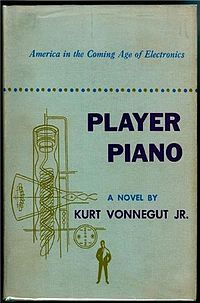Hey everyone,
I started reading Kurt Vonnegut’s Player Piano after I passed C/4 last month. The plot centers around an engineer named Paul Proteus and takes place in an alternative post WW2 era, in which machines have have displaced almost all of human labor. The only jobs left are for engineers, business managers, and hairstylists. As the story progresses, the machines get so good even the engineers end up losing their jobs – hence the title, Player Piano (a Piano that plays music without the need of a human performer). I guess you can see where I’m going with this…I wouldn’t want to spoil the rest, and I haven’t finished the book myself though I’m just 20 pages shy of finishing. Anyway, I became interested in the novel when I was searching the web for articles on post-scarcity economics. The basic idea is that classical economics stems from the conflict between unlimited human wants and limited natural resources. These wants are satisfied through the exchange of goods and services – two or more parties mutually agree to exchange resources – and this is done by valuing one party’s resources against another party’s resources. However, if a society were to achieve the ability to costlessly produce goods and services, the system of exchange and valuation breaks down because you’d no longer be able to value one good relative to another, which makes it impossible for two parties to come to an agreement on how to exchange goods. Some people believe such a system would be more egalitarian since people would no longer have to fight over limited resources. On the other hand, others have hypothesized that such a system would lead not to equality, but to a society dominated by an elite few – the original owners of capital (this is where post-scarcity economics overlaps with Marxist economics).
I’ve thought about such a scenario many times (maybe every other day) but I haven’t been able to reach any solid conclusions over the outcome of this situation. First of all, companies can save costs by automating manual labor and firing workers whose skills have become obsolete. This would result in short term gains because the company would be able to gain market share over its competitors by offering lower prices. However, in order for the company to make money, people would have to be willing to pay for its products. But if such automation were to occur on a large scale, you would end up in a paradoxical situation in which companies would be able to produce goods at no cost – but people wouldn’t be able to buy these goods because they don’t have jobs and aren’t earning wages. Moreover, if these workers aren’t buying goods, then the company won’t make any money. Thus, despite the economy’s ability to produce unlimited goods and services for its people, these people aren’t made any richer because there’s no longer a way to allocate these goods amongst themselves.
Historically, this sort of doomsday scenario hasn’t occurred because automation created more jobs than it destroyed. However, you don’t want to be too careless and assume that automation will continue to create jobs indefinitely just because it has in the past, since there’s no guarantee that this trend of job creation will continue. Perhaps, it might be possible that machines become so effective that they can replace all of human labor…or maybe we’ll eventually get to the point where we can costlessly create humanoid robots that are superior to their biological counterparts, rendering humans obsolete. On the other hand, it might be the case that a post-scarcity society is impossible to achieve. I noticed that in my previous paragraph that the inability to equitably allocate resources amongst a population represents scarcity in service (or scarcity in capital, if you want to take the Marxist point of view). So, while we might not reach post-scarcity, there could be some kind of scenario like “post-human labor”, which would present similar problems.
Anyway, Player Piano is somewhat similar to Zamyatin’s We, and Vonnegut himself said that he “cheerfully ripped off the plot of Brave New World, whose plot had been cheerfully ripped off from Yevgeny Zamyatin’s We.” I read We during the Summer after high school and now that I’m almost done with Player Piano, I can see that the basic structure is similar between the two books, though Vonnegut’s book contains more humor and has a more playful tone than Zamyatin’s. Vonnegut’s book was published in the U.S. after WW2, whereas Zamyatin’s book was written in 1920, suppressed by the Soviets during the Cold War, and later published in 1988. I’d recommend reading both as you’d get to compare the different perspectives between the Soviet Union and the United States, both before the War and afterward.
